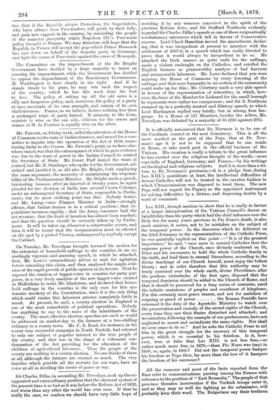Mr. Fawcett, on Friday week, called the attention of the
House of Commons to the state of Indian finances, and moved for a com- mittee to inquire into the operation of the Act of 1858, trans- ferring India to the Crown. Mr. Fawcett's point, as we have else- where stated, was that the extravagance of which he gave evidence was due to the want of power in the Indian Council to control the Secretary of State. Mr. Grant Duff denied the want of control, but Mr. E. Stanhope, who spoke for the Government, ad- mitted and justified it, as did also Mr. Bright, both employing the same argument, the necessity of maintaining the responsi- bility of the Parliamentary Minister. Mr. Bright made a speech, interesting because, after an interval of twenty years, he again pleaded for the division of India into several Crown Colonies, under an unhampered Secretary of State, responsible to Parlia- ment; but its most striking point was this. Nobody denies, and Mr. Laing—once Finance Minister in India—strongly affirms, that Indian finance is in a critical position ; that ex- penditure increases rapidly ; that the Army consumes half the net revenue; that the limit of taxation has almost been reached; and that the question should be seriously taken up by Parlia- ment. It will be taken up, whenever a catastrophe occurs, and then it will be found that the reorganisation must be effected on the spot by a picked Viceroy, unhamperedby anybody except the Cabinet.


































 Previous page
Previous page